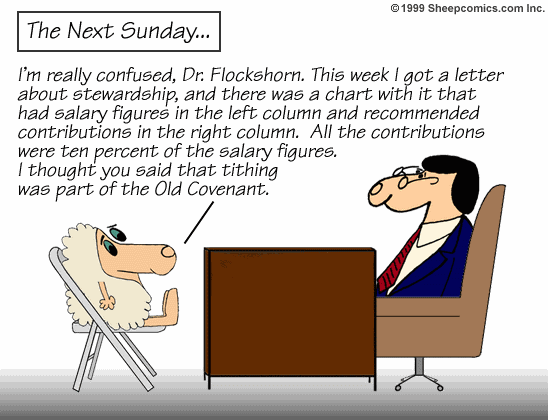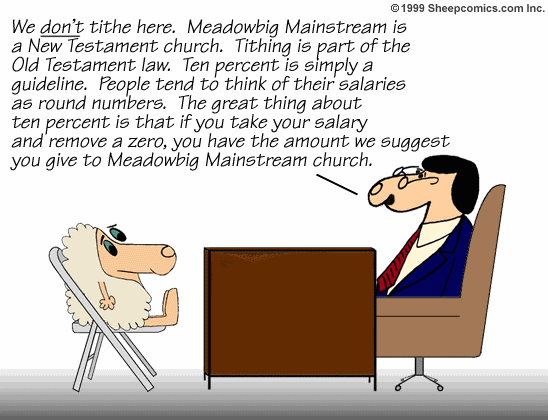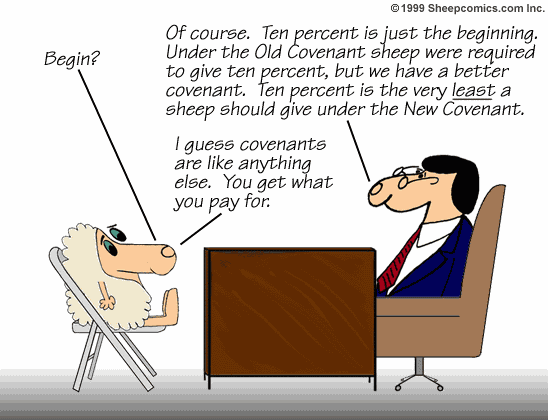












Editorial Notes
This comic scroll deals with the matter of "giving". Every church I have ever encountered has taught some system for how much and often I give money to that church. One of the reasons I became so disillusioned with "church systems" is that I was never taught at church all there is to know about giving under the Old or New Covenants. I had to study it out for myself.
Now, before I go on, I am not commenting on any personal system one may have for giving. Thatís between you and the Lord. Iím also not commenting on what Christians should be spending money on. Thatís also between you and the Lord.
What I take exception to is church systems that invent laws of their own and teach them as if they are commandments of God. The two approaches I am familiar with are 1) Creating a simplistic tithing law from the Old Covenant tithing laws and binding it on people of the New Covenant , or 2) simply taking a select passage from the New Testament out of context and making it law.
A common "doctrine of man" I have heard in mainstream churches is that ten percent of our income represents our tithe, and anything above this represents our offering. This seems to be patterned after the tithing system of the Old Covenant, but it is really a gross oversimplification.
There were actually four "tithes".
First, a yearly tithe for the Levitical priesthood (Numbers 18:20-24).
Second, the Levitesí own tithe, which first went to Aaron the high priest (Numbers 18:25-30) and later to the temple of Israel (Nehemiah 10:38).
Third, there was a yearly tithe that was eaten in Godís presence at the dwelling place of His name. This tithe could be converted to money and the money spent on making merry, even on "strong drink" (Deut 14: 23-26).
Fourth, there was a tithe once every three years (Deut 14:28-29) which the Israelites deposited in their own towns to feed the Levite, the alien, the orphan and the widow.
The typical Israelite contributed about 23% of their income to "tithing", but then they "partied away" one of those tithes.
So, where does the money go that I "tithe" to the modern mainstream church? To the Levitical priesthood? No. Thatís over (see the book of Hebrews). The Leviteís own tithe doesnít seem to apply either, since the Levitical priesthood is over. Does tithe money ever go to a big yearly party? No way! At least Iíve never been invited to one. Finally, does it go to the poor? Maybe a little, sometimes. Iíve been to mainstream churches that make the poor an afterthought, but Iíve never been to one that made the poor a top spending priority. So, if the tithe money isnít spent according to the Old Testament law, why is this Old Testament law bound on my giving?
Iíve found a different approach prevalent among "New Testament" or "restored" churches. 1 Corinthans 16:2 is used to make a "law" that says I must give to the church each week. In this verse, Paul wrote: "On the first day of every week, each one of you should set aside a sum of money in keeping with his income, saving it up, so that when I come no collections will have to be made." This is bound upon the church member as an obligation to contribute money to the church every week. The professional Christians the money is "set aside" for spend it as they see fit.
The problem I have with this is that this passage is part of a much greater story. For the rest of the story, read 2nd Corinthians chapters 8 and 9. Then read Romans 15:24 to 29. Paul wanted the church in Corinth to set aside money once a week so he could make a single collection and take the money to the poor Christians in Jerusalem. All the money was for the poor. It was set aside so that Paul could collect it once, not so that professionals in Corinth could collect it weekly and perpetually spend it on buildings, their own salaries, and anything else they wanted to. Iím not saying that buildings and salaries are necessarily wrong, just that this often abused verse, 1 Corinthians 16:2, has nothing to do with funding them.
In my experience I have found that there is one principal always operative in church system "giving laws" whether they are derived from the Old or New Testament. That is, the scriptures that describe how money is to be collected are bound as law on me. However, the scriptures that describe how that money is to be spent arenít bound as law on the professionals who spend the money.
What is really disillusioning about these teachings is that they are taught by people that, in my opinion, ought to know better. Why not teach everything there is to know about Paulís fund raising activities? There is a lot to learn there. Why not teach the details of Godís system that allowed the "haves" to provide for the priesthood, the "have nots", and a big party in ancient Israel? I studied these things out in a few intense hours, and Iím just an "amateur" Christian.
And, as of this writing, Iím still an amateur cartoonist. Hopefully the "scroll" has loaded below.
Addendum added July 21st, 2001
A reader questioned the way I added up the tithes above, and I went back and read everything in the Old testament about tithing.
Itís quite possible that I counted the first, third, and fourth tithes above as though they were separate tithes when a different explanation is quite possible. Itís possible that my "first" tithe, the one in Numbers 18:20-24, was a general statement, and that this general statement was elaborated upon in Deut 14: 23-26 and Deut 14:28-29. In other words, the passages in Deuteronomy give the exact implementation instructions regarding the tithe mentioned in Numbers 18:20-24.
First, letís look at Deuteronomy 12:17-18, emphasis mine:
You must not eat in your own towns
Second, letís look at Deuteronomy 14:22-29, emphasis mine:
Be sure to set aside a tenth of all that your fields produce each year.
Finally, letís look at Deuteronomy 26:12-12, emphasis mine:
When you have finished setting aside a tenth of all your produce in the third year, the year of the tithe, you shall give it to the Levite, the alien, the fatherless and the widow, so that they may eat in your towns and be satisfied.
Why is the third year called the "year of the tithe"? Isnít every year a "tithe year"?
Between the original editorial and this addendum weíve now covered most all there is about tithing in the Pentateuch. We have only omitted Leviticus 27:30-33, which defines exactly what to tithe. Namely, a tenth of the grain of the soil and fruit from the trees, and of the herd and flock.
So weíve now been through all there is in the Law of Moses concerning tithing. What to make of this? Below is the way I think it might have worked.
Two years of every three, the "tithe" was eaten "in the presence of the LORD". In the third year, the "tithe" was stored locally in town for the Levites, the fatherless, and the widows.
So, when it comes to actually transferring wealth, the Israelites really only gave away one-third of ten percent as "tithes". (There were the various offerings, of course, but we are only concerned with tithing here.)
Interestingly, if we look in Numbers 1:46, we find that there were 603,550 Israelites not including the Levites. In Numbers 3:39 we find that there were 22,000 Levites. If we divide 22,000 by the total number of Israelites (625,550), we find that the Levites represented 3.5 percent of all Israel. One third of a tenth is about 3.3 percent. So, under this tithing system the Levites were receiving wealth from Israel very proportionate to the relative size of their population within Israel. Under my original estimation, I had 3.5 percent of the population receiving about 13.3 percent of the wealth!
By the way, Iím not the first person to work this out. Others have posted this interpretation of the tithing commands on the Internet. One thing Iím quite sure of is that I probably never would have heard this in church.
Web Shepherd